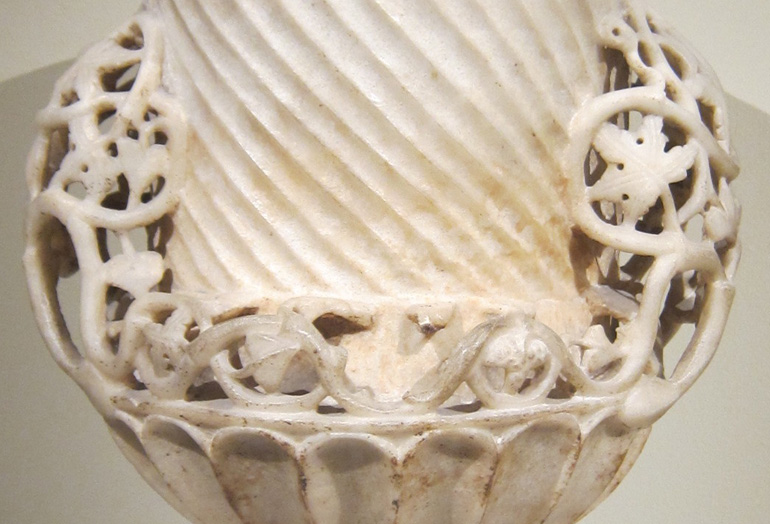Reading Notes:
Halfway Through Horror
11 October 2013
It’s the middle of the afternoon, and I’ve just put down The Circle, which I’m about halfway through. It’s almost unbearable reading, even though the violence and horror are (so far) altogether implicit, offstage, internalized — easy to overlook. That’s what the heroine, Mae Holland, does. Or perhaps what she is does is to translate: to translate advertising into shared information, touting into gracious recommendation. She does not follow the money. She is actually too busy to care about money. But she steadily transforms herself into a bot that makes money for her employer, the eponymous company.
The writing is suitably creepy. Dave Eggers has does not satirize the perversity of business-speak, as Helen DeWitt does so brilliantly in Lightning Rods, but then The Circle is never, not for a minute, funny — whereas Lightning Rods was gruesomely hilarious. Rather, he captures the ingenuous response of a credulous ingénue. The novel’s tone of voice naive, reflecting Mae’s youthful optimism about technological efficiency. (Hers is the kind of “knowing” naiveté that Mark Edmundson finds so dismaying in Why Teach?) From the very beginning, however, the narrative is decked with red flags, some smaller than others but all cumulatively glaring. No sooner does Mae arrive at the “campus” of the vast social-media/search-engine monstrosity, which has learned how to conceal its stings and scales from the blandishments of Disneyland, than the old friend who got her the job plays a dubious joke on her, making it clear to the reader that Mae is going to have to work very hard to overcome normal human discomfort in this environment. Since Mae is a striver, she puts in the hours with relish. But she can barely keep up with the ever-widening demands that The Circle makes. And she fails to notice that her highly-placed friend is cracking up under the strain.
It’s the naiveté that’s distressing, not The Circle’s nefariousness. Eggers has projected a world only a few years into the future from our own, and nothing that he describes is difficult to imagine. In fact, one assumes that the basic mechanisms for the transmutation of personal information into corporate gold are already in place; one has gotten used to that. What’s horrible is Mae’s equable response to such company mottoes as “Secrets are Lies.” One is put in mind of the vulnerability of now-extinct Amerindians to European pathogens, circa 1500. Five hundred years later, young people with a natural and inevitable lack of long-term experience, and whose parents cannot have been expected to train them in the hygiene of streaming information, blithely follow the tootling piper of Twigglebook.
At Salon, Michele Filgate — whom it has been my pleasure to meet — writes about being so upset by The Circle that she went off social media for a spell. She soon saw that that’s not the answer.
Now that I’m back on social media, I’m realizing that the answer isn’t necessarily to deprive yourself. It’s better to find a balance and not think of your life as existing in 140 characters or status updates.
I’ve set up a few rules for myself, too. No tweeting while walking. No checking the phone on the subway. No TweetDeck. It’s far better to check Twitter on the actual website instead of having it open and taunting me all day long. The biggest thing I’ve realized is that I can’t have social media open while I’m writing. I don’t want to become like Mae, sacrificing real-life friendships for the allure of the screen. I want to be aware of the world around me. I want to write about that world. I want to feel more alive, even if that means being lonelier in the process. It’s a book that connected me with myself again — just as books have always done, and always will do.
Finding balance is the most difficult of the arts of living; it is so much easier to go overboard in one direction or the other. We are all such quirky beings that we have can offer little concrete advice to others. Michele’s simple rules probably seem to her, in retrospect, to be no-brainers. That’s because it took a novel to wake her up to the need to think about her envelopment in social media. Once it did, she had no trouble establishing clear boundaries. I doubt that she’ll be alone.
***
Yes, but is it art? The Circle, I mean. Will it remain a satisfying read long after the present crisis has resolved itself in salvation or disaster? Frankly, I don’t much care. It’s engrossing and timely and really smart, not just “knowing.” For me, it’s a work of horror from the first page. For younger readers, it might have a more salutary effect.
While I’m enjoying The Circle, I’m mulling over some very strong words by Jonathan Franzen. They appear at the start of his odd new book, The Kraus Project, a work of indie-rock scholarship. Who is going to read this book? There are three texts: essays by Karl Kraus, a rebarbative writer who worked in the glittering sunset of the Austrian Empire; translations of the essays, on facing pages, by Franzen, and footnoted commentary, running along the bottom of the page and beyond. (Some of the notes are provided by Peter Reitter and Daniel Kehlmann.) It is this commentary, of course, that is the nub of the book: Franzen is using Kraus to show up the sins of contemporary America in different colors.
Vienna in 1910 was, thus, a special case. And yet you could argue that America in 2013 is a similarly special case: another weakened empire telling itself stories of its exceptionalism while it drifts toward apocalypse of some sort, fiscal or epidemiological, climactic-environmental or thermonuclear. Our Far Left may hate religion and think we coddle Israel, our Far Right may hate illegal immigrants and think we coddle black people, and nobody may know how the economy is supposed to work now that our manufacturing jobs have gone overseas, but the actual substance of our daily lives is total electronic distraction. We can’t face the real problems; we spent a trillion dollars not really solving a problem in Iraq that wasn’t really a problem; we can’t even agree agree on how to keep health care costs from devouring the GNP. What we can all agree to do instead is to deliver ourselves to the cool new media and technologies, to Steve Jobs and Mark Zuckerberg and Jeff Bezos, and to let them profit at our expense.
You might also argue that The Circle is a dilation of this grim picture.




















